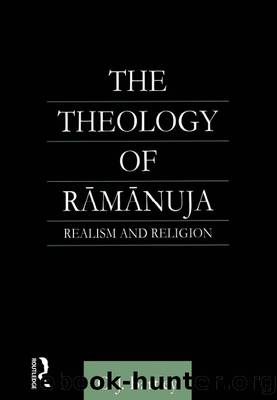The Theology of Ramanuja by Bartley C. J

Author:Bartley, C. J.
Language: eng
Format: epub
ISBN: 9781136853067
Publisher: Taylor & Francis (CAM)
Chapter Five
Exegeses of the MahÄvÄkya, âSatyaá¹ jñÄnam anantaá¹ Brahmaâ: âThe Absolute is Reality, Consciousness, Infiniteâ
As we have seen, scriptural exegesis is central to VedÄntic theological method. The theologian understands himself as deriving his conclusions (siddhÄnta) from Åruti which, according to the VedÄntic ideology is the sole means of knowing (pramÄá¹a) about whatever lies beyond the bounds of sense. Interpretations of the mahÄvÄkya, âSatyaá¹ jñÄnam anantaá¹ Brahmaâ (Taitt.Up.2.1.1) illustrate the centrality of the question of the import of syntopical, co-referential constructions (samÄnÄdhikaraá¹a) in VedÄntic theological dialectic. SÄmÄnÄdhikaraá¹ya is defined as, âthe application to one entity of a number of words having different grounds for their application.â The appositional words have the same case ending and express one and the same thing.
At this point attention must be drawn to Frege's distinction (also made by Bhartá¹hari) between the sense of a word or expression and the referent which it denotes. The distinction was originally made to explain how a true identity statement could be informative; in the way that âCicero is Tullyâ is and âCicero is Ciceroâ is not. The reference of a word or expression is the entity for which it stands. Referring expressions or singular terms stand for objects. Predicates stand for concepts which may or not be instantiated. Sentences stand for truth-values. Singular terms and predicates (perse incomplete expressions) combine to form sentences whose referents are a product of the references of their parts. Senses are inter-subjective âmodes of presentationâ (i.e. not idiosyncratic mental images) of references. The senses of the sentence-constituents (i.e. singular terms and predicates) combine to form the sentential sense which Frege calls a complete thought. The expressions, âThe Morning Starâ and âThe Evening Starâ refer to the same object (the planet Venus) in different ways which are their objective or intersubjective senses, modes of presentation or cognitive significances. It may thus come as a surprise to someone to learn that what they called âthe Morning Starâ and what they called âthe Evening Starâ are the same thing. If the referent of an expression is the destination, then its sense is the route. The proper name âScottâ and the description, âThe author of Waverleyâ (which Frege classifies as a singular term) have the same referent (the man Walter Scott) but differ in sense. Thus we can explain locutions such as âGeorge IV did not know that Scott was the author of Waverleyâ without attributing to that monarch ignorance of the fact of Scott's being Scott. That it may come as a surprise to someone to learn that what they called âthe Morning Starâ and what they called âthe Evening Starâ are the same thing or that Cicero is none other than Tully or that Mary Ann Evans is George Eliot, is alleged to show that reference is not a constituent of meaning.
Sense is held by Frege to determine reference. He means that or understanding of a locution never consists merely in our associating something with a word or expression. There must be some means by which this association is effected, the knowledge of which constitutes our grasp of the expression's sense.
Download
This site does not store any files on its server. We only index and link to content provided by other sites. Please contact the content providers to delete copyright contents if any and email us, we'll remove relevant links or contents immediately.
The Lost Art of Listening by Michael P. Nichols(7506)
Why I Am Not A Calvinist by Dr. Peter S. Ruckman(4153)
The Rosicrucians by Christopher McIntosh(3521)
Wicca: a guide for the solitary practitioner by Scott Cunningham(3179)
Signature in the Cell: DNA and the Evidence for Intelligent Design by Stephen C. Meyer(3138)
Real Sex by Lauren F. Winner(3023)
The Holy Spirit by Billy Graham(2953)
To Light a Sacred Flame by Silver RavenWolf(2824)
The End of Faith by Sam Harris(2742)
The Gnostic Gospels by Pagels Elaine(2532)
Waking Up by Sam Harris(2461)
Nine Parts of Desire by Geraldine Brooks(2370)
Jesus by Paul Johnson(2363)
Devil, The by Almond Philip C(2333)
The God delusion by Richard Dawkins(2309)
Heavens on Earth by Michael Shermer(2285)
Kundalini by Gopi Krishna(2185)
Chosen by God by R. C. Sproul(2165)
The Nature of Consciousness by Rupert Spira(2108)
